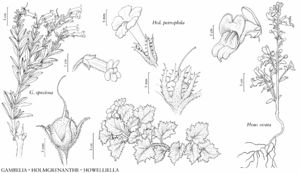Howelliella ovata
Leafl. W. Bot. 7: 115. 1954.
Stems 10–50 cm, branches spreading or ascending. Leaves: blade ovate, 10–50 × 5–20 mm, apex glandular, glandular-hairy. Pedicels 2–4 mm. Flowers chasmogamous; calyx lobes unequal, lateral and abaxial lanceolate, 4–5 mm, apex acute, adaxial ovate, 11–12 mm, apex obtuse, gland-tipped; corolla slightly curved, 17–22 mm, glandular-hairy externally, mouth 6–8 mm diam., abaxial lip soon withering, palate yellow, slightly convex, not blocking mouth. Capsules ovoid, 8–10 mm, puberulent, with 3 apical pores. Seeds sometimes asymmetric, 1 mm, reticulate-ridged. 2n = 32.
Phenology: Flowering May–Jul.
Habitat: Slopes on clay soils, burned or disturbed sites.
Elevation: (200–)500–1000 m.
Discussion
Howelliella ovata is found only on clay soil in limited areas of Kern, Monterey, San Benito, San Luis Obispo, and Ventura counties. D. M. Thompson (1988) suggested that it needs disturbance to prosper, especially fire followed by heavy rain, and pointed out that the spreading, lateral branches sometimes help support the main stem. They are stout and strong and do not resemble the filiform, twining branchlets found in some species of Sairocarpus.
Selected References
None.
